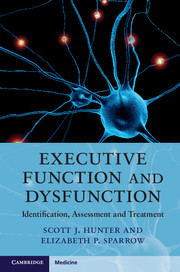Book contents
- Frontmatter
- Contents
- Editor biographies
- List of Contributors
- Preface
- Acknowledgments
- Introduction
- Section I Foundations of Executive Function/Dysfunction
- Section II Executive Dysfunction in the Neurodevelopmental and Acquired Disorders
- Introduction to Section II
- Chapter 5 Executive functions in disruptive behavior disorders
- Chapter 6 Executive functions in autism spectrum disorders
- Chapter 7 Executive functions in intellectual disability syndromes
- Chapter 8 Executive functions in pediatric movement and motor control disorders
- Chapter 9 Executive functions in learning disorders
- Chapter 10 Executive functions in mood and anxiety disorders
- Chapter 11 Executive functions in childhood epilepsy
- Chapter 12 Executive functions in pediatric cancer
- Chapter 13 Executive functions in HIV
- Chapter 14 Executive functions and neurotoxic exposure
- Chapter 15 Executive functions after congenital and prenatal insults
- Chapter 16 Executive functions in acquired brain injury
- Section III Applications
- Appendix 1 Abbreviations used in the book
- Appendix 2 Tests/tasks referenced in the book
- Index
- References
Chapter 11 - Executive functions in childhood epilepsy
from Section II - Executive Dysfunction in the Neurodevelopmental and Acquired Disorders
Published online by Cambridge University Press: 05 October 2012
- Frontmatter
- Contents
- Editor biographies
- List of Contributors
- Preface
- Acknowledgments
- Introduction
- Section I Foundations of Executive Function/Dysfunction
- Section II Executive Dysfunction in the Neurodevelopmental and Acquired Disorders
- Introduction to Section II
- Chapter 5 Executive functions in disruptive behavior disorders
- Chapter 6 Executive functions in autism spectrum disorders
- Chapter 7 Executive functions in intellectual disability syndromes
- Chapter 8 Executive functions in pediatric movement and motor control disorders
- Chapter 9 Executive functions in learning disorders
- Chapter 10 Executive functions in mood and anxiety disorders
- Chapter 11 Executive functions in childhood epilepsy
- Chapter 12 Executive functions in pediatric cancer
- Chapter 13 Executive functions in HIV
- Chapter 14 Executive functions and neurotoxic exposure
- Chapter 15 Executive functions after congenital and prenatal insults
- Chapter 16 Executive functions in acquired brain injury
- Section III Applications
- Appendix 1 Abbreviations used in the book
- Appendix 2 Tests/tasks referenced in the book
- Index
- References
Summary
Epilepsy, which is defined by a pattern of recurring seizures, comprises an array of diseases and syndromes within an evolving classification framework. The cardinal feature of epilepsy is the electroclinical event, an anomalous behavior or sensory alteration that correlates with abnormal electrophysiological activity in the brain. Clinical manifestations of childhood epilepsy are broad, ranging from fleeting reductions of consciousness, to simple sensory and motor events, to complex behaviors and disruptions of higher-level cognition. Electrophysiological events associated with seizures also vary in form and localization.
Cognition in childhood epilepsy is influenced by several factors, including: (1) underlying genetic, metabolic, and neuropathologic processes that give rise to epileptic events, (2) transient event-related neurophysiological disruptions, (3) neuronal injury caused by epileptic events leading to progressive neurologic and cognitive deterioration, and (4) adverse effects of antiepileptic drugs (AEDs). Environmental and disease factors such as age of onset, seizure frequency, and epilepsy type or syndrome have also been associated with cognitive outcome in childhood epilepsy. In light of this heterogeneity, the failure to identify a “signature profile” of neuropsychological impairment in childhood epilepsy is not surprising. However, many forms of childhood epilepsy are associated with disruptions of behavior or cognition that are potentially indicative of EdF.
Information
- Type
- Chapter
- Information
- Executive Function and DysfunctionIdentification, Assessment and Treatment, pp. 149 - 157Publisher: Cambridge University PressPrint publication year: 2012
References
Accessibility standard: Unknown
Why this information is here
This section outlines the accessibility features of this content - including support for screen readers, full keyboard navigation and high-contrast display options. This may not be relevant for you.Accessibility Information
- 1
- Cited by
